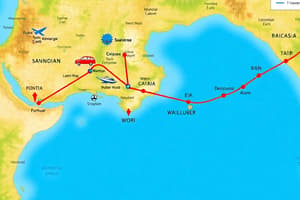Podcast
Questions and Answers
Which of the following best describes the scope of tourism?
Which of the following best describes the scope of tourism?
- Tourism consists solely of business-related travel.
- Tourism encompasses a wide range of activities and experiences. (correct)
- Tourism includes only travel for leisure.
- Tourism is limited to domestic travel within one country.
What aspect is NOT typically included in the scope of tourism?
What aspect is NOT typically included in the scope of tourism?
- Adventure tourism activities.
- Ecotourism focused on environmental conservation.
- Travel for residential purposes. (correct)
- Cultural exchange between tourists and locals.
Which of the following is an example of a type of tourism?
Which of the following is an example of a type of tourism?
- Agritourism that combines agriculture and tourism. (correct)
- Commuting to work daily by public transport.
- Telecommuting for work remotely at home.
- Staying at home during vacations.
What is a primary characteristic of the scope of tourism?
What is a primary characteristic of the scope of tourism?
Which of the following roles does tourism play in local economies?
Which of the following roles does tourism play in local economies?
Flashcards are hidden until you start studying
Study Notes
Defining Tourism Scope
- Tourism encompasses a wide range of activities, travelers, and destinations
- It's a complex phenomenon that integrates various sectors like transportation, accommodation, hospitality, and entertainment
- The scope of tourism is not limited to leisure or recreation but also includes business, educational, and health tourism
Key Components of Tourism Scope
- Activities: Tourism encompasses a vast array of activities, including sightseeing, cultural experiences, adventure activities, relaxation, shopping, and educational pursuits. These activities can vary significantly in intensity and duration.
- Travelers: Tourism involves the movement of people from their place of residence to a destination. The scope considers the motivations for the travel, duration of travel, and the purpose of their stay. This includes domestic tourism (travel within one's own country) and international tourism.
- Destinations: Tourism destinations can encompass a region, city, or a specific attraction. The scope includes destinations' characteristics, infrastructure, resources, and the overall visitor experience they offer. Destinations can vary from remote nature areas to bustling urban centers.
Factors Influencing Tourism Scope
- Economic factors: Tourism is a significant driver of economic activity, impacting local economies through employment, revenue generation, and infrastructure development. Economic growth and poverty reduction are important considerations.
- Social factors: Interactions between tourists and local communities influence cultural exchange and understanding. The social impact of tourism can also involve the preservation of cultural heritage and traditions, as well as potential challenges like gentrification.
- Environmental factors: Tourism's effect on the environment ranges from habitat disruption to pollution. The scope considers the necessity of sustainable tourism practices. Environmental impact assessment and conservation efforts are crucial.
- Political factors: Governmental policies, infrastructure development, and international relations influence tourist flows and destination development. This includes visa requirements and promotion strategies.
Interconnections within the Scope of Tourism
- Tourism and the hospitality industry: The scope of tourism is closely linked to the hospitality industry, encompassing accommodation, food service, and entertainment. This interaction drives employment and revenue generation.
- Tourism and transportation: Tourism depends critically on transportation, from airlines and trains to buses and personal vehicles. Connectivity and accessibility are vital to facilitate tourism flows.
- Tourism and the environment: The environment plays a significant role in shaping tourist destinations. The scope of tourism includes the need for environmentally conscious practices. This includes efforts to mitigate the negative environmental impacts.
- Tourism and culture: Tourism often leads to cultural exchange and interaction between visitors and locals. The scope encompasses the preservation of cultural heritage and traditions, while dealing with the challenges of cultural miscommunication.
Sustainable Tourism and the Scope
- Sustainability considerations: Modern tourism increasingly emphasizes sustainable practices that minimize the environmental and social impacts of tourism. This involves careful planning, resource management, and community involvement.
- Environmental conservation: The scope of tourism includes efforts aimed at preserving natural areas that often act as key destinations. Sustainable practices reduce pollution and habitat degradation, supporting the ecological integrity.
- Community well-being: Tourism can positively impact local communities by creating jobs and providing economic opportunities. The scope of tourism involves considerations for social equity and community involvement. Sustainable practices support the well-being of local communities.
Studying That Suits You
Use AI to generate personalized quizzes and flashcards to suit your learning preferences.




